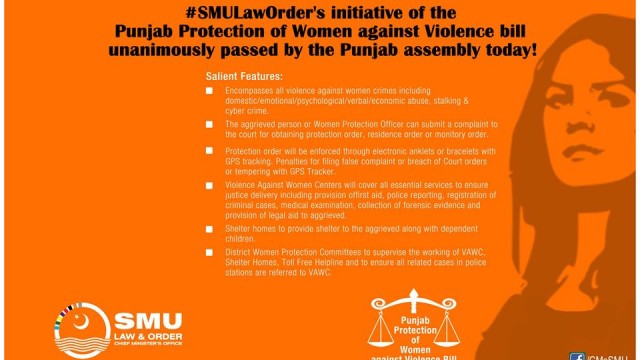Punjab Assembly Approves Bill For Protection Of Women Against Violence
The historic Punjab Protection of Women Against Violence Bill 2015 that faced a lot of opposition even from the government quarters and was finally passed by the Punjab Assembly on Wednesday 25th February, provides for the first time in the history of the country, comprehensive protection to women against a range of crimes.
The list of crimes includes abatement of an offence, domestic, emotional, psychological and economic abuse, stalking and cyber crime. It was approved by the provincial cabinet in May 2015 and could not be passed by the assembly because of in-house objections even by those belonging to the ruling party.
The bill was drafted by Chief Minister’s Special Monitoring Unit (Law and Order), which is headed by Salman Sufi, in collaboration with departments concerned and civil society.
It introduces for the first time an in-built implementation mechanism through the district Violence Against Women Centres (VAWCs), court orders (residence, protection and monetary), introduction of GPS tracked electronic bracelets-anklets to enforce protection orders and power to enter any place to rescue the women victims. It also encompasses cyber crime, domestic violence, emotional, economic and psychological abuse within the ambit of ‘violence against women’ crimes.
The stated aim is to ensure justice to women victims and to empower them, placing them on an equal footing with the male population. The bill stands out, as compared to previously passed bills, on domestic violence as it also provides civil remedies — protection, residence and or monetary order — for all the offences it covers. This is in addition to, and not contradictory to or abrogating, the existing laws on violence against women crimes.
Through a residence order, the victim has a right to stay in the house if she doesn’t want to vacate it or the defendant has to provide an alternative accommodation to the victim if she wants so. Further, if she is being harassed or stalked, she can claim a protection order which ordains the defendant to not communicate with her or stay a certain distance from her. In addition, the victim can also seek monetary relief from the defendant to meet expenses occurred and losses suffered through monetary orders in this bill.
Provisions exist to punish acts of domestic violence and other VAW crimes in the Pakistan Penal Code (PPC), however the issue lies in the implementation of these sections. Women victims of violence currently have to go through a snake-and-ladder game for merely getting a case registered.
This bill aims to solve the problem of FIRs registration through establishment of 24-hour women-run VAWCs where the case-flow process would be streamlined by bringing all the needed facilities under one roof – first aid, police reporting, FIR lodging, prosecution, medical examination, forensics and post-trauma rehabilitation.
Besides, the centres will provide facilities like legal assistance, immediate protection to the aggrieved, evidence collection within due time to facilitate investigation, audio-visual record of all actions.
They will initiate VAW cases, establish a toll-free helpline, mediate between the aggrieved and the defendant for non-cognisable offenses if requested by the victim, and act as community centres to guide women in all government-related inquiries.
A ‘District Women Protection Committee’ will supervise the centres and shelter homes, ensuring that all VAW cases registered in any of the district’s police stations are referred to these centres. The District Women Protection Officer (DWPO) will have power to enter any place to rescue the aggrieved with her consent. The officer can also file a habeas corpus case on the basis of any credible information of wrongful confinement of an aggrieved person.
Under this legislation, the aggrieved or any authorised person or the DWPO can submit a complaint to the court to obtain civil remedies.
Several penalties (imprisonment and/or fine) have been laid out in the Bill, including those for obstructing a protection officer, filing a false complaint and breach of court orders or tampering with the GPS tracked system.
This news was previously published in DAWN and it is being republished here with permission.



In absence of definition of Harassment or actionable harassment, dont u think rights created under this law will be used against men, especially the “Husbands or Ex- Husbands” involved in Child Custody Litigation, as a revenge ?
what mechanism has been provided under the law to differentiate between false allegations of domestic violence and genuine infliction of violence!
with the inclusion of this clause (h) which states that “domestic violence” means the violence committed by the defendant
with whom the aggrieved is living or has lived in a house when they are related to each other by consanguinity, marriage or adoption; is an attempt to subject ex- husbands to revenge and to debar them to have access to their children?